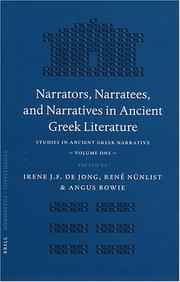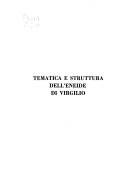| Listing 1 - 7 of 7 |
Sort by
|
Book
ISSN: 00816450 ISBN: 9789173468893 9173468894 9173468908 9789173468909 Year: 2016 Volume: 70 Publisher: Kriterium
Abstract | Keywords | Export | Availability | Bookmark
 Loading...
Loading...Choose an application
- Reference Manager
- EndNote
- RefWorks (Direct export to RefWorks)
"A critical edition, with English translation and notes, of chapters 27–60 of the Semeioseis gnomikai (“Sententious notes”), a collection of 120 essays by the Byzantine statesman and scholar Theodore Metochites (1270–1332). The edition is based on three manuscripts, which are briefly presented in the introduction. P (Par. gr. 2003, Paris) and M (Marc. gr. 532, Venice) were both written in the early fourteenth century; E (Scor. gr. 248, Escorial) is a sixteenth-century copy of M.After the edition, with accompanying English translation and notes, the book is concluded with a bibliography and three indexes: of quoted passages, Greek words, and Greek names.Several of the essays in this volume contain laments on the reduced state of the Eastern Roman Empire (Byzantium), and on the vicissitudes of human life and fortune. A group of short essays describe the pleasure of beholding Creation and one of the longest discusses the pros and cons of having been born, i.e. of life."
Authors, Classical --- Rhetoric, Ancient --- Philosophy, Ancient --- History --- Metochites, Theodoros, --- Philosophy --- Greece --- Historiography --- Philosophie ancienne --- Rhétorique ancienne --- Byzantine Empire --- Empire byzantin --- Civilization --- Civilisation --- Rhétorique ancienne --- Rhetoric, Ancient. --- Classical texts --- Authors, Classical - History - Sources --- Rhetoric, Ancient - History - Sources --- Philosophy, Ancient - History - Sources --- Metochites, Theodoros, - d. 1332 - Translations into English --- Metochites, Theodoros, - d. 1332 - Philosophy --- Greece - Historiography --- Metochites, Theodoros, - d. 1332

ISBN: 9004139273 9786610859634 1429427086 9047405706 1280859636 143370613X 9789004139275 9781429427081 9789047405702 Year: 2017 Volume: 257 Publisher: Brill
Abstract | Keywords | Export | Availability | Bookmark
 Loading...
Loading...Choose an application
- Reference Manager
- EndNote
- RefWorks (Direct export to RefWorks)
This is the first in a series of volumes which together will provide an entirely new history of ancient Greek (narrative) literature. Its organization is formal rather than biographical. It traces the history of central narrative devices, such as the narrator and his narratees, time, focalization, characterization, description, speech, and plot. It offers not only analyses of the handling of such a device by individual authors, but also a larger historical perspective on the manner in which it changes over time and is put to different uses by different authors in different genres. The first volume lays the foundation for all volumes to come, discussing the definition and boundaries of narrative, and the roles of its producer, the narrator, and recipient, the narratees.
Greek literature --- Narration (Rhetoric) --- Rhetoric, Ancient --- History and criticism. --- Rhetoric, Ancient. --- History --- Ancient rhetoric --- Antieke retoriek --- Retoriek [Antieke ] --- Retoriek van de Oudheid --- Rhetoric [Ancient ] --- Rhétorique ancienne --- Rhétorique de l'Antiquité --- Littérature grecque --- Narration --- Rhétorique ancienne --- Histoire et critique --- Classical languages --- Greek language --- Greek rhetoric --- Latin language --- Latin rhetoric --- History and criticism --- Rhetoric --- To 500 --- Discourse analysis, Narrative --- Narratees (Rhetoric) --- Literature & literary studies --- Literary studies: classical, early & medieval --- Greek literature - History and criticism. --- Littérature grecque --- Histoire et critique.
Book
ISBN: 1905670699 9781905670697 9781905670512 Year: 2017 Publisher: University of London Press
Abstract | Keywords | Export | Availability | Bookmark
 Loading...
Loading...Choose an application
- Reference Manager
- EndNote
- RefWorks (Direct export to RefWorks)
This volume brings together six papers relating to oratory and orators in public fora of Classical Greece and Rome. Edwards and Bers explore aspects of oratorical delivery in the Athenian courts and Assembly, including the demands placed on orators by the physical settings. Tempest examines the conceptions of oratorical competence and incompetence, particularly in respect of performance, as they are implied in Cicero’s criticisms of the rival prosecutor in the trial of Verres. Papers by Karambelas and Powell look at evidence for the importance of advocacy in the Second Sophistic and the late Roman Empire respectively. In an introduction, the editors discuss recurrent themes connected with the orator’s competence and performance, while the final paper of the volume, by Lord Justice Laws, reflects on the continuing relevance of rhetoric in the modern, highly professionalised practice of the law in England.
Oratory, Ancient --- Speeches, addresses, etc., Greek --- Rhetoric, Ancient --- Civilization, Greco-Roman --- Classical literature --- History --- History and criticism --- Greek orations --- Greek speeches --- History and criticism.
Book
ISBN: 9789004440197 9789004440265 Year: 2020 Publisher: Brill
Abstract | Keywords | Export | Availability | Bookmark
 Loading...
Loading...Choose an application
- Reference Manager
- EndNote
- RefWorks (Direct export to RefWorks)
"This volume collects papers on pragmatic perspectives on ancient theatre. Scholars working on literature, linguistics, and theatre will find interesting insights on verbal and non-verbal uses of language in ancient Greek and Roman Drama. Comedies and Tragedies spanning from 5th B.C.E. to 1st C.E. are investigated in terms of im/politeness, theory of mind, interpersonal pragmatics, and body language, to name some of the approaches which afford new interpretations of difficult textual passages or shed new light into nuances of characterisation, or possibilities of performance. Words, silence, gestures, do things, all the more so in dramatic dialogues on stage"--
Classical drama --- Gesture in literature --- Interpersonal communication --- Language and languages in literature --- Pragmatics --- Rhetoric, Ancient --- Speech acts (Linguistics) --- Theater --- History and criticism --- Congresses. --- History

ISBN: 2251328467 9782251328461 Year: 1982 Publisher: Belles Lettres
Abstract | Keywords | Export | Availability | Bookmark
 Loading...
Loading...Choose an application
- Reference Manager
- EndNote
- RefWorks (Direct export to RefWorks)
Aesthetics --- Esthétique --- History --- Histoire --- Rhetoric, Ancient --- Rhetoric --- History. --- -Beautiful, The --- Beauty --- Esthetics --- Taste (Aesthetics) --- Philosophy --- Art --- Criticism --- Literature --- Proportion --- Symmetry --- Psychology --- -History --- Esthétique --- Radio broadcasting Aesthetics --- Aesthetics - History --- Rhetoric - History.

ISBN: 9060322452 Year: 1983 Publisher: Amsterdam : B.R. Grüner,
Abstract | Keywords | Export | Availability | Bookmark
 Loading...
Loading...Choose an application
- Reference Manager
- EndNote
- RefWorks (Direct export to RefWorks)
Virgil. --- Aeneas (Legendary character) in literature --- Epic poetry, Latin --- -Rhetoric, Ancient --- Rome in literature --- Classical languages --- Greek language --- Greek rhetoric --- Latin language --- Latin rhetoric --- Latin epic poetry --- Latin poetry --- History and criticism --- Rhetoric --- Virgil --- Virgilio Marone, P. --- Vergilius Maro, Publius --- Vergilīĭ --- Virgile --- Vergílio --- Wergiliusz --- Vergilīĭ Maron, P. --- Vergilīĭ Maron, Publīĭ --- Verhiliĭ Maron, P. --- Vergil --- Virgilio --- Virgilīĭ --- Virgilius Maro, P. --- Virgilius Maro, Publius --- Virgil Maro, P. --- ווירגיל --- וירגיליוס --- ורגיליוס --- מרו, פובליוס ורגיליוס --- فرجيل --- Pseudo-Virgil --- Pseudo Virgilio --- Virgilio Marón, Publio --- Bhārjila --- Aeneas (Legendary character) in literature. --- Rhetoric, Ancient. --- Rome in literature. --- History and criticism. --- Virgilio Marone, P., --- Vergilīĭ, --- Virgile, --- Vergílio, --- Wergiliusz, --- Vergilīĭ Maron, Publīĭ, --- Verhiliĭ Maron, P., --- Vergil, --- Virgilio, --- Virgilīĭ, --- Virgilius Maro, P., --- Virgilius Maro, Publius, --- Virgil Maro, P., --- ווירגיל, --- וירגיליוס, --- ורגיליוס, --- מרו, פובליוס ורגיליוס, --- فرجيل, --- Pseudo-Virgil, --- Pseudo Virgilio, --- Virgilio Marón, Publio, --- Bhārjila, --- Ancient rhetoric --- Rhetoric, Ancient --- Rome --- In literature.
Book
ISSN: 00816450 ISBN: 9789173469937 9173469939 9173469947 9789173469944 Year: 2018 Volume: 71 Publisher: Kriterium
Abstract | Keywords | Export | Availability | Bookmark
 Loading...
Loading...Choose an application
- Reference Manager
- EndNote
- RefWorks (Direct export to RefWorks)
This is the third volume of a planned four-volume edition of the Σημειώσεις γνωμικαί (Sententious notes), a collection of 120 essays by the Byzantine scholar and statesman Theodore Metochites (1270-1332). The introduction gives an extensive, partly new, description and assessment of the manuscripts as physical objects and in their relationship to each other. The manuscripts discussed, and used in the edition, are the Par. gr. 2003 (P) and Marc. gr. 532 (M), both contemporary or near-contemporary with the author, and, wherever M is illegible, the Scor. gr. 248 (E), a sixteenth-century copy of M. In the edition, the reading of P (including the corrections by the main copyist, Michael Klostomalles, as well as a manus secunda) is generally adopted as the authoritative text. The volume concludes with a bibliography, an index of passages, and an index of names. The discussion in the essays touches upon several subjects, more or less related to each other. Among these are the ignorance of man and the difficulty of knowing anything, and the moral side of seeking an active life as opposed to "living hidden".
Authors, Classical --- Rhetoric, Ancient --- Philosophy, Ancient --- Ecrivains anciens --- Rhétorique ancienne --- Philosophie ancienne --- Ouvrages avant 1800 --- Classical texts --- Prose: non-fiction --- Literary essays --- Humanities --- Ethics & moral philosophy --- Metochites, Theodoros, --- Translations into English. --- Greece --- History --- Philosophy. --- Metochita, Theodore, --- Metochita, Theodorus, --- Métochite, Théodore, --- Metochites, Theodore, --- Metochites, Theodorus, --- Theodore Metochita, --- Théodore Métochite, --- Theodore Metochites, --- Theodoros Metochites, --- Theodorus Metochita, --- Theodorus Metochites, --- Theoleptos, --- al-Yūnān --- Ancient Greece --- Ellada --- Ellas --- Ellēnikē Dēmokratia --- Elliniki Dimokratia --- Grčija --- Grèce --- Grecia --- Gret︠s︡ii︠a︡ --- Griechenland --- Hellada --- Hellas --- Hellenic Republic --- Hellēnikē Dēmokratia --- Kingdom of Greece --- République hellénique --- Royaume de Grèce --- Vasileion tēs Hellados --- Xila --- Yaṿan --- Yūnān --- Ελληνική Δημοκρατία --- Ελλάς --- Ελλάδα --- Греция --- اليونان --- يونان --- 希腊
| Listing 1 - 7 of 7 |
Sort by
|

 Search
Search Feedback
Feedback About UniCat
About UniCat  Help
Help News
News